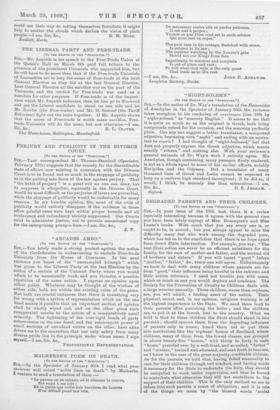"NIGHT-SOLEMN."
[To TUN EDITOR OF THE "SPNCT■TOR.1 the notice of Dr. Way's translation of the Eumenides of Aeschylus in the Spectator of January 30th the reviewer takes exception to his rendering of veerio-feva (line 108) by " night-solemn " as "scarcely English." It seems to me that it is quite as much so as the original is Greek, both being compounds coined for the occasion, and the meaning perfectly plain. Can any one suggest a better translation, a compound adjective, beginning with "night" and ending with an equiva- lent to creptir P I had thought of "night-hallowed," but that does not properly express the Greek adjective, which means exactly " solemn " and nothing else. With your reviewer's general estimate of Dr. Way's work I entirely agree. His Aeschylus, though containing many passages finely rendered, is not as a whole equal to some of his earlier efforts, notably Euripides and the Odyssey. But a translator of many thousand lines of Greek and Latin cannot be expected to keep up a uniform high standard throughout; if he did so, it would, I think, be scarcely less than miraculous.—I am,










































 Previous page
Previous page